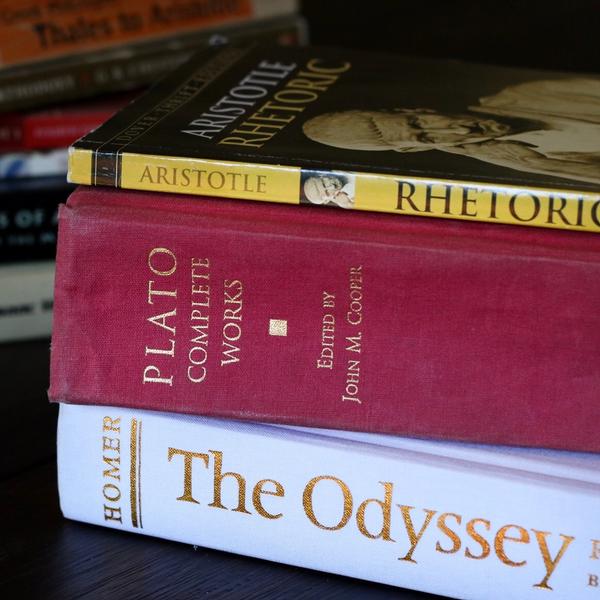RTCS BLOG
Why Classical Christian Education?

As a sophomore at the University of Pittsburgh, I found myself in a situation that many college students find themselves facing: changing my major. Initially accepted as a nursing student, I decided to focus on classics and philosophy instead. It was an abrupt and suprising change to many, and I distinctly remember someone asking why I would choose to study philosophy at a secular college of all places. The question took me off guard because my decision to pair my classics major with a minor in philosophy was, to myself and my parents, natural and applaudable. The Lord provided me with a classical Christian education at a formative age. Thanks to this, my parents and I had confidence in my ability to reason through the maelstrom of secular worldviews and philosophies.
In her 1947 essay, “The Lost Tools of Learning,” Dorothy Sayers, British author and friend of C.S. Lewis and J.R.R. Tolkien, presents an idea for a modern classical education. Despite being written decades before the invention of social media, her concerns are eerily pertinent to twenty-first-century life. She laments that the average person is “susceptible to the influence of advertisement in mass propaganda” because the consumer isn’t equipped to logically consider the varying messages. Sayers believes that modern public education isn’t teaching students how to learn or think on their own; essentially, sending the student “unarmed, in a day when armor was never so necessary.”
This fear is not only justified, but the proper arming of oneself is an exhortation found in Scripture. In his first letter to the Thessalonians, Paul commands the believer to “test everything; hold fast to what is good.” It’s a simple command but overwhelming in its application. How do I test everything? What is the standard by which I am to judge? How will I know if what I have found is good? Sayers’ proposal to reintroduce a medieval model of education called the Trivium, or today known as classical Christian education, a model adopted by Robinson Township Christian School, answers each of these concerns.
The starting point for any classical Christian education is the Bible. In 2 Timothy 3:16–17 (ESV), Paul writes, “All Scripture is breathed out by God and profitable for teaching, for reproof, for correction, and for training in righteousness, that the man of God may be complete, equipped for every good work.” This conviction that the Word of God is the standard of good lays the groundwork for the application of Sayers’ education model, which teaches students based on their three developmental stages: grammar, dialectic, and rhetoric.
Grammar: Young children are like sponges. Information is absorbed and regurgitated. They love to learn and recite stories, facts, songs, and so on. Teaching a child in this stage is mainly encouraging them to memorize. Memorize Bible verses, multiplication tables, scientific facts, rhymes, stories, and songs. Take the opportunity to fill their minds and hearts with the truths of this world to be used as a building block in later stages. In this stage educators are giving the young learner the inclination towards what is good and right before the learner has the maturity of mind to reason his or her way to it.
Dialectic: The onset of the dialectic stage comes around middle school, when a student begins flexing more argumentative muscles. With the introduction of logic, both formal and informal, the student is given the means to deconstruct an argument and build their own. They are taught to recognize fallacies and inconsistencies and, most importantly, taught to argue respectfully. They use their new analytical skills in more complicated mathematics, literature, and essay writing.
Rhetoric: As the young students mature, they find themselves to be full of their own ideas, thoughts, and feelings. At a time when the majority of teenagers are feeling misuderstood, the classical model enourages self-expression based on the building blocks of the grammar and the dialectic. They have been given the facts, they have been taught the rules of logic and debate, now they are instructed in public speaking. Whereas the dialectic can be viewed as a fist—unforgiving in its rules and application—the rhetoric is an open hand, beckoning others to listen and be persuaded. At RTCS the capstone of the rhetoric stage is the senior thesis, wherein the student publicly presents and defends a thesis before a panel of judges.
Classical Christian education takes the strengths of each age and molds it to be used to battle, defend, and attack against the onslaught of undigested and ill-condsidered opinions of the age. “For the sole true end of education is simply this: to teach men how to learn for themselves; and whatever instruction fails to do this is effort spent in vain,” Sayers writes. When properly applied, the students of classical Christian education graduate with the tools and confidence to test the deluge of opinions they encounter daily, refuting the bad and holding fast to what is good.
For those who are interested, the full text of “The Lost Tools of Learning” by Dorothy Sayers can be found here: http://www.gbt.org/text/sayers.html
